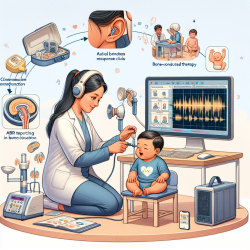Introduction
The COVID-19 pandemic has undoubtedly impacted various aspects of life, including health behaviors. A recent study titled "Characterizing fluid intake and physical activity in university students within the United States during the COVID-19 pandemic" offers insights that can be instrumental for practitioners aiming to improve outcomes for children. This blog explores how findings from this study can be applied in the context of speech-language pathology and child development.
Understanding the Research
The study examined fluid intake and physical activity behaviors among university students during the pandemic. Key findings include gender differences in fluid consumption, with females consuming less fluid than males. Additionally, living arrangements influenced alcohol consumption, and physical activity levels varied among different racial groups. The study highlights the importance of maintaining adequate hydration and physical activity, which are crucial for overall health and well-being.
Implications for Practitioners
As practitioners focused on child outcomes, we can draw several lessons from this study:
- Hydration Awareness: Encourage children to maintain adequate hydration. Proper hydration is essential for cognitive function, which directly impacts learning and communication skills.
- Promoting Physical Activity: Develop programs that incorporate physical activities tailored to children's needs. Physical activity not only supports physical health but also enhances cognitive development and emotional well-being.
- Consideration of Environmental Factors: Recognize the impact of living environments on health behaviors. Encourage environments that support healthy habits, such as access to water and opportunities for physical activity.
Encouraging Further Research
The study underscores the need for ongoing research to understand the long-term effects of the pandemic on health behaviors. Practitioners are encouraged to engage in research initiatives or collaborate with researchers to explore these impacts further. By doing so, we can develop evidence-based strategies to support children's development in a post-pandemic world.
Conclusion
The findings from this study offer valuable insights for practitioners dedicated to improving child outcomes. By applying these insights, we can foster environments that promote hydration, physical activity, and overall well-being. Together, let's strive to create a future where children can thrive, regardless of the challenges they face.
To read the original research paper, please follow this link: Characterizing fluid intake and physical activity in university students within the United States during the COVID-19 pandemic.










